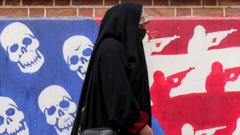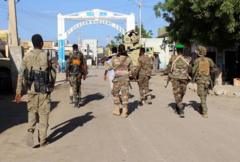As urgent negotiations loom between the US and Iran concerning nuclear capabilities, both sides remain entrenched in their positions, complicating any potential agreement.
US-Iran Nuclear Negotiations: Diplomatic Gridlock Unfolds

US-Iran Nuclear Negotiations: Diplomatic Gridlock Unfolds
Both nations continue to diverge ahead of imminent discussions in Oman.
In recent days, tensions have escalated as US President Donald Trump refocuses on a longstanding objective: addressing Iran's nuclear aspirations. Since withdrawing from the Joint Comprehensive Plan of Action (JCPOA) in 2018, which aimed to curb Iran's nuclear ambitions in exchange for lifted sanctions, the US has reinstated strict economic measures. Despite Iran's assertions of no intent to develop nuclear weapons, fears persist that it may pursue the capacity to create a nuclear arsenal, eliciting concerns of regional conflict and an arms race.
The landscape of these negotiations is precarious. While US officials have stressed the urgency of a deal, threatening military repercussions should talks fail, Iran is grappling with its collapsing economy and internal pressures but remains wary of compromising its nuclear enrichment rights. The ongoing crisis, marked by rising inflation and a depreciating currency in Iran, complicates decision-making for its leaders. Some analysts suggest the current situation may push Iran toward considering a nuclear deterrent as a means of national defense.
As both sides prepare for direct discussions in Oman over the weekend, the fundamental disagreement over Iran's nuclear program remains a sticking point. The US administration is advocating for a complete dismantlement of Iran's nuclear framework, including halting uranium enrichment altogether, which Tehran views as a red line.
International dynamics further complicate the negotiations, particularly the position of Israel, which has firmly opposed any Iranian nuclear capability. Israeli officials are pressing for an outcome akin to Libya's disarmament deal in 2003, a precedent unlikely to persuade Iranian leadership.
The potential consequences of failed negotiations loom large. Israel has not ruled out military options to target Iran's nuclear facilities, though executing such operations would entail significant risk and operational challenges. As Israel additionally strengthens its military posture, the possibility of a broader regional conflict warrants caution.
Current predictions indicate a two-month timeline for reaching an agreement, although past negotiations like the JCPOA highlight the complexities inherent in such diplomatic endeavors. Observers will be keenly watching to ascertain whether swift diplomacy can yield substantive results or if the window for cooperation will close entirely, leading to an escalation of tensions.
The landscape of these negotiations is precarious. While US officials have stressed the urgency of a deal, threatening military repercussions should talks fail, Iran is grappling with its collapsing economy and internal pressures but remains wary of compromising its nuclear enrichment rights. The ongoing crisis, marked by rising inflation and a depreciating currency in Iran, complicates decision-making for its leaders. Some analysts suggest the current situation may push Iran toward considering a nuclear deterrent as a means of national defense.
As both sides prepare for direct discussions in Oman over the weekend, the fundamental disagreement over Iran's nuclear program remains a sticking point. The US administration is advocating for a complete dismantlement of Iran's nuclear framework, including halting uranium enrichment altogether, which Tehran views as a red line.
International dynamics further complicate the negotiations, particularly the position of Israel, which has firmly opposed any Iranian nuclear capability. Israeli officials are pressing for an outcome akin to Libya's disarmament deal in 2003, a precedent unlikely to persuade Iranian leadership.
The potential consequences of failed negotiations loom large. Israel has not ruled out military options to target Iran's nuclear facilities, though executing such operations would entail significant risk and operational challenges. As Israel additionally strengthens its military posture, the possibility of a broader regional conflict warrants caution.
Current predictions indicate a two-month timeline for reaching an agreement, although past negotiations like the JCPOA highlight the complexities inherent in such diplomatic endeavors. Observers will be keenly watching to ascertain whether swift diplomacy can yield substantive results or if the window for cooperation will close entirely, leading to an escalation of tensions.






















